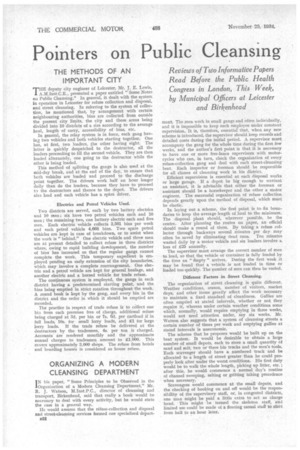ORGANIZING A MODERN CLEANSING DEPARTMENT
Page 36

If you've noticed an error in this article please click here to report it so we can fix it.
I N his paper, "Some Principles to be Observed in the Organization of a Modern Cleansing Department," Mr. R. J. Watson, M.Inst.P.C., director of cleansing and transport, Birkenhead, said that really a book would be necessary to deal with every activity, but he would state the case in a general way.
Ile would assume that the refuse-collection and disposal and street-cleansing services formed one specialized departs= meat. The men work in small gangs and often individually, and it is impossible to keep each employee under constant supervision. It is, therefore, essential that, when any new scheme is introduced, the supervisor should keep records and detailed costs during the initial period. A supervisor must accompany the gang for the whole time during the first few weeks, and the author's first point is that it is necessary to have one or more free-lance supervisors with motorcycles who can, in turn, check the organization of every refuse-collection gang and deal with each street-cleansing beat. Each inspector or foreman should be responsible for all classes of cleansing work in his district.
Efficient supervision is essential at each disposal works or large garage. If a depot be big enough to warrant an assistant, it is advisable that either the foreman or assistant should be a horselteeper and the other a motor engineer. The successful organization of refuse collection depends greatly upon the method of disposal, which must be elastic.
In laying out a scheme, the first point is to-fix bomis daries to keep the average length of haul to the minimum. The disposal plant should, wherever possible, be the centre. After planning the routes on paper, an official should make a round of them. By taking a refuse collector through backways several minutes per day may often be saved by eliminating dead runs. Ten minutes wasted daily by a motor vehicle and six loaders involve a loss of £.25 annually.
The supervisor must arrange the correct number of men to load, so that the vehicle or container is fully loaded by the time an " empty " arrives. During the first week it may be found that a vehicle is not loaded in time or loaded too quickly. The number of men can then be varied.
Different Factors in Street Cleansing.
The organization of street cleansing is quite different.
Weather conditions, season, number of visitors, market days, and other items greatly affect the work necessary
to maintain a fixed standard of cleanliness. Gullies are often emptied at stated intervals, whether or not they require it, whereas under certain weather conditions some which, normally, would require emptying in three weeks, would not need attention under, say six weeks. Mr. Watson also suggests that a system of cleansing streets a certain number of times per week and emptying gullies at stated intervals is uneconomic.
The scheme that he proposes would be built up on the beat system. It would be desirable to obtain a large number of small depots, each to store a small quantity of sand and salt, two or three bin trucks and the men's tools. Each scavenger should have a numbered truck and be allocated to a length of street greater than he could properly look after under the worst conditions. His first duty would be to walk the whole length, picking up litter, etc. ; after this, he would commence a normal day's routine of channel sweeping, salting or gritting taking precedence when necessary.
Scavengers would commence at the small depots, and the checking of booking on and off would be the responsibility of the supervisory staff, or, in congested districts, one man might be paid a little extra to act as charge hand. This might he termed the skeleton staff, and limited use could he made of a floating casual staff to start from half to an hour later.




























































































